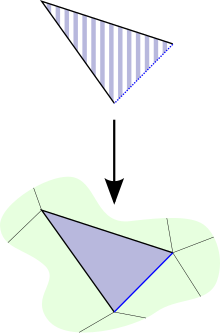Kan complex
In algebraic topology , a branch of mathematics , Kan complexes are an aid for the combinatorial definition of homotopy groups.
definition
A simplicial set is a Kan complex if it satisfies the Kan extension property :
- for all and every -elemental set of -Simplices with for all there is a -Simplex with for .
Homotopy groups
DM Kan gave a combinatorial definition of homotopy groups for Kan complexes.
Example: the singular chain complex
Let be a topological space and its singular chain complex : the n-simplices of are the continuous mappings of the standard n-simplex after .
is a Kan complex, its homotopy groups (in the sense of Kan) match the homotopy groups of .
literature
- J. Peter May : Simplicial objects in algebraic topology. Reprint of the 1967 original. Chicago Lectures in Mathematics. University of Chicago Press, Chicago, IL 1992, ISBN 0-226-51181-2 .
Web links
Individual evidence
- ^ Daniel Marinus Kan: A combinatorial definition of homotopy groups. In: Ann. of Math. (2) 67 1958, pp. 282-312.













